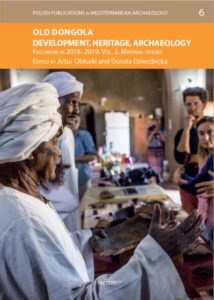-
KUP ONLINE

Co-financed from the “Excellent Science” program of the Ministry of Science and Higher Education, Republic of Poland.
-
Artur Obłuski and Dorota Dzierzbicka (eds), Old Dongola: Development, Heritage, Archaeology. Fieldwork in 2018–2019. Vol. 2: Material Studies (=Polish Publications in Mediterranean Archaeology 6), Leuven–Paris–Bristol: Peeters Publishers
Polish Publications in Mediterranean Archaeology is a PCMA UW book series published by Peeters Publishers.
Leuven 2022
ISBN 9789042948020
e-ISBN: 9789042948037
X-402 p.Old Dongola was the capital city of the Medieval Christian kingdom of Makuria (modern Sudan) from the early 6th to the 14th century. Although the royal court abandoned the city in 1364, it remained an important urban center with extensive residential quarters functioning on and around the citadel hill until the end of the 19th century. An archaeological expedition from the Polish Centre of Mediterranean Archaeology, University of Warsaw, has been working at Old Dongola since 1964. A new project, “UMMA. Urban Metamorphosis of the community of a Medieval African capital city”, funded by the European Research Council, was launched in 2018.
UMMA (Arab. for ‚community’) is a multidisciplinary project conceived of as the first study of the liminal phases of the Christian African community inhabiting Old Dongola and the emergence of a Muslim city-state organized along different social and religious paradigms. The project investigates the impact that the weakening of the central authority and migrations of Arab tribes had on the kingdom’s capital city and its community and seeks to trace patterns of continuity and change on a household level. It is one of the few excavation projects in Sudan systematically conducted on a deep-stratified urban site spanning the Funj period (16th-18th centuries).
Material studies presented in this volume offer insights on household assemblages and the function of the uncovered objects within the domestic space. Personal items found in the excavated contexts help derive information on the everyday apparel of the city’s inhabitants and on their customs.
Artur Obłuski, PhD hab., the Principal Investigator of the UMMA project and Director of the Polish Expedition to Old Dongola, is an archaeologist and Nubiologist who devoted his academic career to the study of transition periods in the history of Nile Valley societies. He is also director of the Polish Centre of Mediterranean Archaeology, University of Warsaw and the president of the International Society for Nubian Studies.
Dorota Dzierzbicka, PhD, Field Director of the UMMA project, is an archaeologist with experience on sites in Egypt and Sudan. Her research interests revolve around economic history of the Nile Valley, from household management to long distance trade.
Cover photo: Mateusz Rekłajtis
Do pobrania (pliki PDF):
Full Text (PDF)
